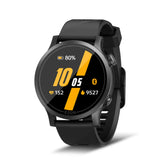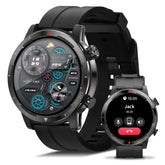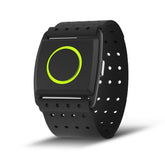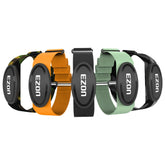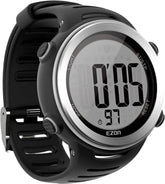Marathon Training for Beginners: How to Build Endurance Without Burning Out
Training for your first marathon is an exciting journey, but rushing the process can lead to burnout or injury. This marathon training program prioritizes gradual progress, strategic rest, and smart cross-training to help beginners build endurance building safely. With a GPS running watch to track pace and recovery, you’ll learn to listen to your body and conquer 26.2 miles with confidence.
1. Core Principles for Beginner Marathoners
A. The 10% Rule: Avoid Overtraining
- Mileage Increase: Never boost weekly mileage by more than 10% to reduce injury risk (e.g., 20 miles/week → max 22 miles next week).
- Pace Focus: Run easy days at a conversational pace (Zone 2, 60–70% max heart rate) to build aerobic base without strain.
B. Rest Days Are Non-Negotiable
- Active Recovery: 1–2 days/week of gentle activities (yoga, walking) to improve mobility and reduce muscle soreness.
- Complete Rest: 1 day/week with no structured exercise to allow full recovery—use a GPS running watch to track resting heart rate (a drop indicates improved fitness).
C. Cross-Training for Balance
- Low-Impact Activities: Cycling, swimming, or elliptical training 1–2 days/week to boost cardio without knee strain.
- Strength Training: 2x/week core and lower-body workouts (squats, lunges, planks) to support running form and prevent muscle imbalances.
2. 16-Week Training Plan: From 0 to Marathon
Phase 1: Base Building (Weeks 1–4)
- Goal: Build consistency, improve running economy, and adapt to training.
- Weekly Mileage: Start with 10–15 miles, focusing on run-walk intervals (e.g., 5 minutes running + 1 minute walking).
- Key Workout: One weekly long run, increasing by 10% weekly (e.g., Week 1: 4 miles → Week 4: 6 miles).
Phase 2: Endurance Building (Weeks 5–8)
- Goal: Increase long run distance and introduce tempo runs for pace adaptation.
- Weekly Mileage: 15–25 miles, with one tempo run (20–30 minutes at 75% max heart rate).
- Long Run: Build to 10–12 miles by Week 8, practicing fueling (e.g., gel every 45 minutes) and hydration.
Phase 3: Peak Training (Weeks 9–12)
- Goal: Reach peak mileage and simulate race conditions.
- Weekly Mileage: 25–35 miles, including one long run of 18–20 miles (your longest run of the plan).
- Brick Workouts: Pair a 10K run with 30 minutes of strength training to build mental toughness.
Phase 4: Taper (Weeks 13–16)
- Goal: Reduce fatigue, maintain fitness, and prepare for race day.
- Weekly Mileage: Gradually decrease by 30% (Week 13: 25 miles → Week 16: 15 miles).
- Key Focus: Easy runs and mobility work, with a final 10-mile race-pace simulation 1 week out.
3. How a GPS Running Watch Enhances Training
A. Precision Pacing
- Real-Time Alerts: Set pace goals for each workout (e.g., 9:00/mile for easy runs, 8:00/mile for tempo runs) and receive vibration alerts if you’re off track.
- Route Mapping: Use preloaded GPS to explore new paths safely, avoiding overdistance or getting lost.
B. Overtraining Prevention
- Heart Rate Variability (HRV): A high HRV means your body is recovered; a low HRV (or resting heart rate 5+ BPM higher than usual) signals the need for rest.
- Training Load Analysis: Track weekly intensity to ensure you’re not exceeding the 10% mileage rule—most watches calculate this automatically.
C. Recovery Tracking
- Sleep Quality: Monitor deep sleep stages to ensure you’re getting 7–9 hours of rest, critical for muscle repair and immune function.
- Post-Workout Data: Review average heart rate, calorie burn, and pace to adjust future workouts for better efficiency.
4. Sample Weekly Training Schedule (Weeks 5–8)
| Day | Activity | Details |
|---|---|---|
| Monday | Easy Run | 30 minutes at Zone 2, focusing on form |
| Tuesday | Strength Training | Core + lower body (squats, lunges, planks) |
| Wednesday | Tempo Run | 10-minute warm-up, 2x10 minutes at race pace, 10-minute cool-down |
| Thursday | Cross-Training | 45 minutes cycling or swimming, easy effort |
| Friday | Rest or Yoga | Active recovery with gentle stretching |
| Saturday | Long Run | 90 minutes at easy pace, practicing fueling |
| Sunday | Rest or Gentle Walk | 30 minutes recovery walk, no structured exercise |
5. Common Beginner Mistakes to Avoid
- Ignoring Rest Days: Overtraining increases the risk of shin splints and burnout—use your GPS running watch to schedule recovery automatically.
- Rushing Pace: Focus on time on feet, not speed—speed will come with endurance.
- Neglecting Nutrition/Hydration: Practice fueling in long runs to avoid “hitting the wall” (e.g., 30g carbs every 30 minutes).
6. Gear Essentials for Beginners
A. GPS Running Watch
- Key Features: Long battery life (20+ hours for long runs), waterproofing, and HRV monitoring (e.g., EZON GPS Series).
- Why It Matters: Eliminates guesswork, ensuring you stay on plan and recover properly.
B. Running Shoes
- Neutral or Stability Shoes: Choose based on your gait (get a professional fitting to prevent injuries).
- Break Them In: Wear new shoes for 50+ miles of training before race day.
C. Recovery Tools
- Foam Roller: Daily use on quads and IT bands to reduce tightness.
- Compression Socks: Improve circulation during long runs and post-workout recovery.
7. Mental Prep for Race Day
- Visualization: Imagine crossing the finish line during your long runs to build confidence.
- Pacing Strategy: Start slower than goal pace (first 5K at 10% slower) to save energy for the second half.
- Celebrate Milestones: Acknowledge each long run and training week as a step closer to your goal.
Train Smart, Finish Strong
With a structured marathon training program, intentional rest days, and a GPS running watch as your coach, you’ll build endurance building safely and avoid the pitfalls of overtraining. Remember, marathon training is a marathon itself—focus on progress, listen to your body, and trust the process.
Lace up, start slow, and let each run be a lesson in patience and perseverance. By race day, you’ll not only finish 26.2 miles but also gain the resilience to tackle any challenge that comes your way.
EZON Watch: Professional sports technology brand
https://ezonwatch.com
https://ezonwatch.com
